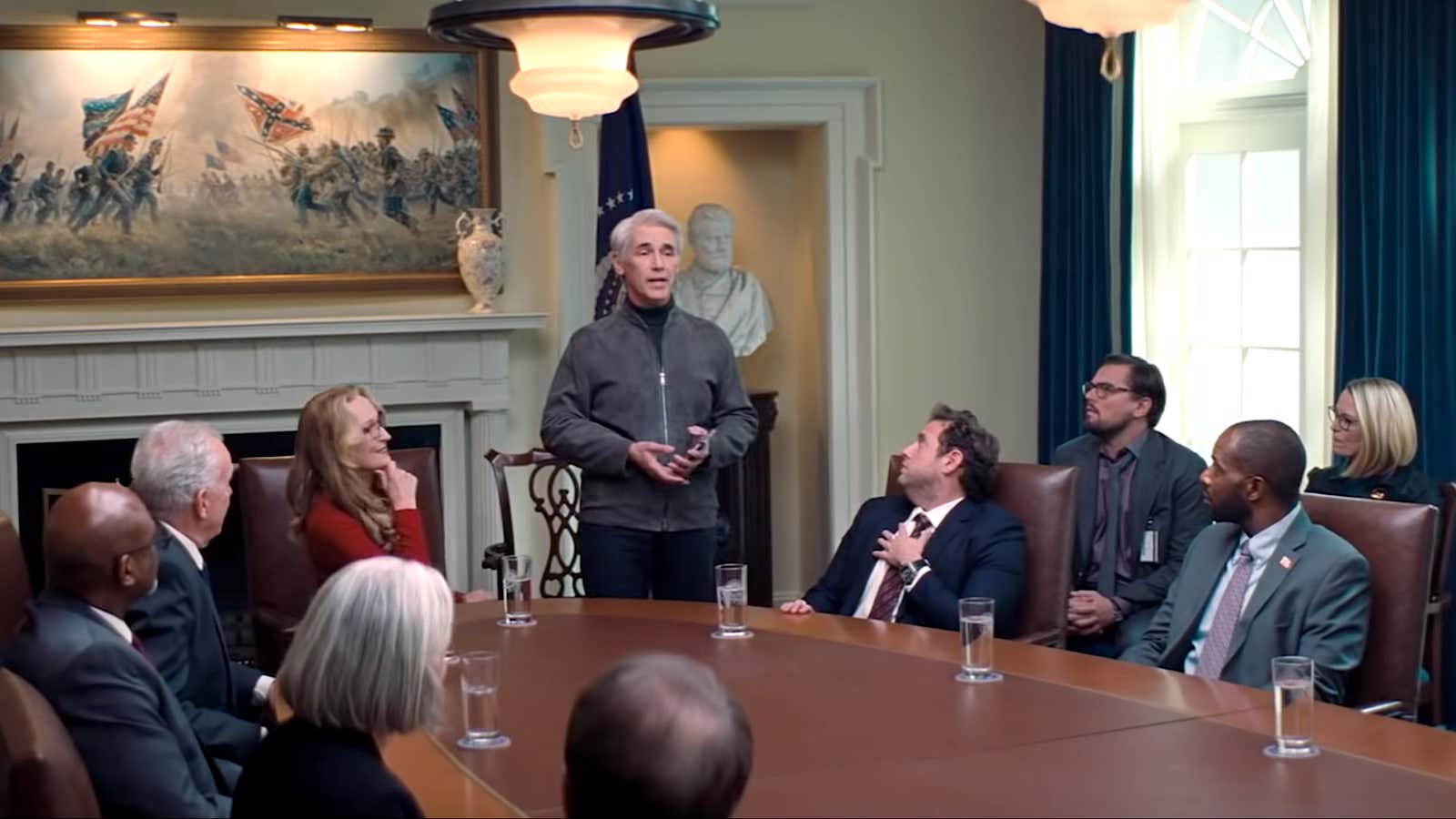The 2021 doomsday satire Don’t Look Up was the most-watched film on Netflix for December. With an all-star cast including Leonardo DiCaprio, Cate Blanchett, Meryl Streep, and Jennifer Lawrence, the film, directed by Adam McKay, depicts a world in crisis as a planet-destroying comet hurtles toward Earth. Scientists attempt to warn government officials, but the mundane snarls of politics, social media, and profit lead to apocalyptic slapstick that’s something like Idiocracy meets Dr. Strangelove.
But unlike the latter, a Stanley Kubrick classic, that foreshadowed the height of nuclear war panic in the 1980s, Don’t Look Up focuses on a timelier existential threat: the creeping control of Big Tech over nearly everything.
Warning: Spoilers ahead
After the scientific community finally convinces the US president (Streep) to launch a mission to fragment the comet in space, BASH Cellular CEO Peter Isherwell (played by Mark Rylance) swoops in and takes over. The tech billionaire wants to “optimize” the mission by mining rare minerals from the comet as it enters Earth’s orbit. And because Isherwell is a “platinum Eagle-level” donor to the president’s campaign, what he says goes.
“When these treasures from heaven are claimed, poverty as we know it, social injustice, loss of biodiversity—all these multitudes of problems are just gonna become relics of the past and humanity is gonna stride through the Pillars of Boaz and Jachin naked into the glory of a golden age,” says Isherwell to a rapt cabinet meeting audience. “Interplanetary, interstellar, intergalactic existence for the human race!”
Who controls the controllers?
The Isherwell character is a deft amalgam of Big Tech’s current rock stars: The halo of harmless beneficence surrounding Apple CEO Tim Cook, the unwavering gaze into the future of Amazon founder Jeff Bezos, the robotic cadence of Meta CEO Mark Zuckerberg, and the detached from Earthly matters verbiage of SpaceX CEO Elon Musk.
So while social media overload and its fake news byproducts, as well as the dark Möbius strip of politics and profit, command most of the film’s narrative, the real villain of Don’t Look Up arguably is Silicon Valley and the world’s capitulation to its whims.
Early in the film, when Isherwell completes a public presentation for the latest BASH smartphone operating system, he quickly sheds his benign humanitarian mask backstage and asks, “Are you sure the video of the puppy on the rooster is optimizing our prepubescent sense memory consumer sector?”
The character’s cynicism about plucking the public’s heartstrings transcends the hyperbole of the film and mirrors today’s real-world smartphone marketing—messaging that holds sway over the lives of over 6 billion smartphone users.
The fate of the planet is in Big Tech’s hands, and there is no punchline
When Isherwell’s data-driven mission fails, thus condemning Earth to death, he slips away to hop onboard his escape spacecraft, mildly stunned, leaving billions of unwitting tech devotees behind to sort things out on their own in their last hours.
Hollywood has long used the US business mogul as the whipping boy to illustrate society’s ills. But when Musk and his meme-framed stoicism is elevated to a hosting gig on Saturday Night Live and Bezos gets press coverage for Instagramming glamour shots in a disco shirt and mirror shades for New Year’s Eve, it’s a reminder that tech CEOs wield more cultural influence than ever—and this influence is currency in politics, business, and countless other realms where other people’s lives can be touched.
In the hands of tech’s leadership elite, the limits of control over a free society are gradually being erased.
That is the real message—actually, warning—that Don’t Look Up does its best to impart. Is wealth by way of tech optimization the correct new ethical framework? Should humanity go to Mars or direct its attentions to the environmental catastrophes where humans currently live? Does the planet really need next-day deliveries and e-commerce-everything, or should fair wages, universal healthcare, and climate change be the priority?
The tech moguls would say look at the data. McKay’s film says look again.
